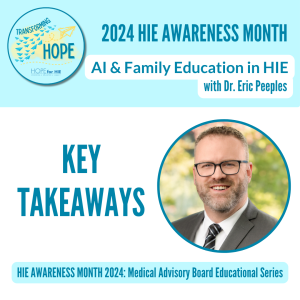
Between our phones, laptops, computers, and the myriad of other devices we use daily, it’s almost as if we have a virtual companion at our fingertips, ready to assist with any HIE-related questions or concerns, day or night. It’s natural to turn to digital tools for research and support, but here’s the catch: while AI offers convenience, it doesn’t always guarantee the reliability and accuracy of information families deserve. When navigating complex conditions like HIE, discerning between trustworthy information and misinformation is crucial. So what’s the solution?
Eric Peeples, a Neonatalogist at Children’s Nebraska, met with Hope for HIE to discuss how he and a team of researchers at the University of Nebraska Omaha are solving just that. How? By harnessing AI to bridge information gaps and provide tailored support to our HIE families.
Exciting, right? We think so, but what we like even more is that you can directly support this initiative by adding valuable input and feedback in its beta testing phase!
Missed the Q&A? Don’t worry, we took notes, and like any good partner, we’re willing to share. Read our takeaways below!

Like families, clinicians also encounter hurdles with communication. One significant challenge, as Dr. Eric explains, is the constraint of time and presence. As families juggle the complexities of having a sick child in the NICU with other life obligations, clinicians often find it challenging to synchronize productive conversations. Phone updates become the norm, yet amidst these conversations, the background noise of everyday life can intrude, making it hard to engage in a meaningful or productive dialogue.
To overcome this challenge, Dr. Peeples explains how it’s crucial for providers to commit to translating complex medical jargon into digestible language that meets families at their level. This approach has gained traction in the last few years, especially in the context of medical training, but there’s always room to grow.
It also goes without saying that parents and caregivers of those with HIE have to jump over their own set of communication hurdles — this can range from attempting to have serious, emotionally-and-mentally-fatiguing conversations about their child’s health or plan of care to feeling afraid to ask questions for fear of being judged by a clinician or other healthcare provider.
While there truly is no dumb question, Dr. Peeples says, this fact does not always remove the inner fear or shame that caregivers can feel in the moment, especially when the stakes are high and the pressure to make quick yet informed decisions is intense.

It’s in these moments, he explains, that a lot of families turn to their devices and search engines in their quest for answers, and while that can sometimes yield helpful results, it’s more likely that they have to sift through potentially misleading information in those engines to be able to get to the important, core information in an easy-to-understand manner.
Why? Because many search engines prioritize websites of organizations that pay them, often leading families to sources that may not necessarily offer scientifically or medically accurate information. In a general search result for HIE, for instance, you may notice that legal websites, which often share misinformation about the actual percentage of HIE causes that are preventable, appear at the top of your algorithm. And the reliable information that does exist is often behind a paid medical firewall and inaccessible to the average family.
All of this is to say: there is a critical need for a search engine tool that yields reliable, unbiased information sources tailored to the HIE family’s unique needs during such challenging and uncertain times.

While technology has undeniably empowered families to enhance their understanding of medical concepts, nuances still exist when it comes to effective communication and education: as much as we’d love for this to be an option, it’s just not plausible for clinicians and other resources, like medical librarians, to consistently provide immediate feedback and expert guidance to families in real-time, especially when it’s most needed.
This gap prompted Dr. Peeples to search for innovative solutions to bridge the divide between timely support, reliable information, and expert advice.
Enter AI. Aside from our general fear of robots running the world, we must admit that Chatbots and AI systems present a promising avenue for accessing information efficiently, with their remarkable ability to manipulate language and provide clarity tailored to various audiences. From simplifying medical jargon to translating complex concepts into understandable terms, AI holds immense potential to transform how families access and comprehend medical information…
…but here’s the “but.” Large language models, like ChatGPT, pull information from every publicly available source, making it biased. Much of the medical literature, as we mentioned before, is behind a paywall and is therefore unavailable. Long story short: the reliable, scientifically based research information is not getting pulled into those chat boxes, and the misleading or false information is getting pulled in instead.

Recognizing this problem and its need for a solution, Dr. Peeples recruited a team of brilliant researchers to help, including Dr. Chun-Hua Tsai, an Assistant Professor in the Department of Information Systems and Quantitative Analysis at the College of Information Science & Technology at the University of Nebraska at Omaha.
Their aim? To better understand the facilitators and barriers the Hope for HIE community faces when seeking educational information and support programming around HIE and create a one-stop-AI-shop where families can find comprehensive and trustworthy information from trusted resources, organizations, and advocacy groups, basically alleviating the need to navigate potentially biased or misleading sources.
This will be a freely available application that our families can access from multiple platforms, like their cell phones and computers, and will provide real-time responses to their questions about HIE — covering everything from an HIE diagnosis to the wide range of its impacts and outcomes.

The next step is to gather feedback on refining and enhancing this platform.
Enter you. The study team is looking for 10 participants to engage in three (3) 1-hour video interviews via teleconferencing software, with the option for more HIE community members to serve as beta testers when the tool is developed in future project phases.
Participants will be compensated for their time and participation. Sign up at the link below:

While we wait with bated breath and thank our lucky stars that doctors and researchers like Dr. Peeples and Dr. Tsai are ready and willing to advocate for our HIE families and little-non-profit that could, here are some resources they recommend utilizing in the meantime.
Dr. Peeples says medical librarians are overlooked gems in the healthcare landscape, as they serve as integral guides for clinicians and families. With their expertise in sifting through vast amounts of information, they play a crucial role in providing reliable resources and support. If you’re conveniently located by a hospital-affiliated university, then the chances are that there’s a medical librarian or two to help you out.
He also suggests looking into local early development networks, which are typically available in each state and offer services such as early intervention programs, therapy services, parent education and support groups, and connections to community resources. The CDC has outlined these networks for each state at this link.
To watch the full live stream, visit our YouTube channel below, or click on our Key Takeaways for an at-a-glance view of this session!
Connect with families, read inspiring stories, and get helpful resources delivered right to your inbox.